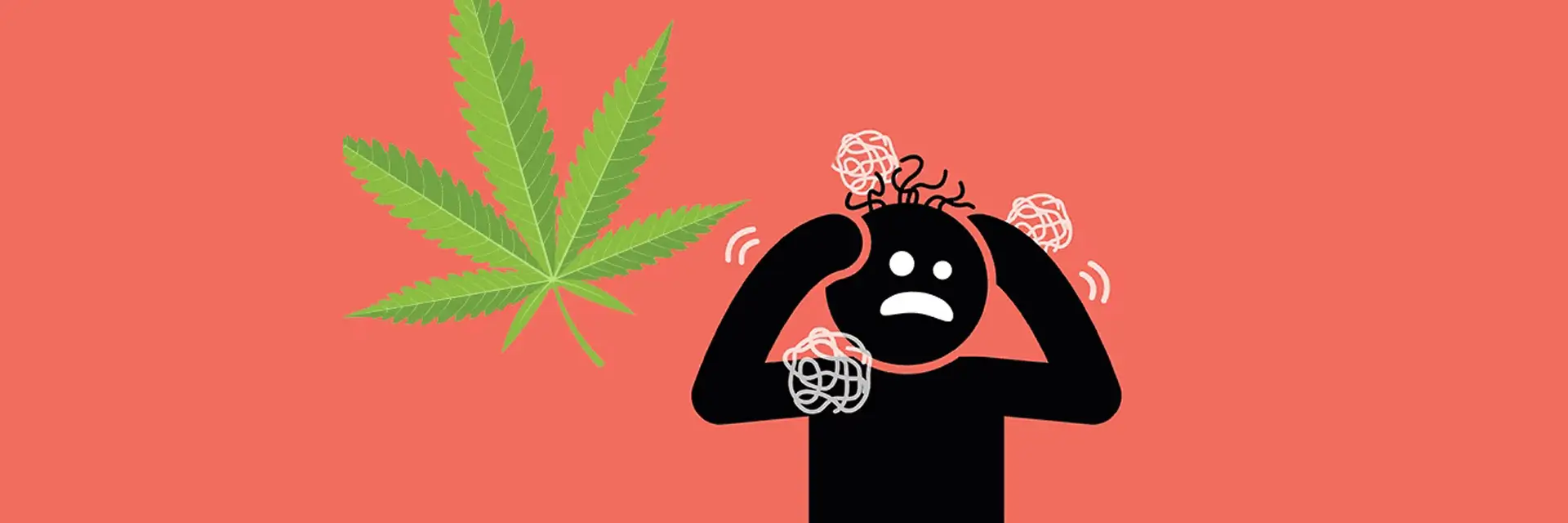Cannabis, often referred to as marijuana, is a widely utilized psychoactive drug. While many people associate cannabis use with feelings of relaxation and euphoria, quitting after heavy or prolonged use can lead to a cluster of withdrawal symptoms. These symptoms are typically uncomfortable but not dangerous and include irritability, anxiety, insomnia, and changes in appetite. This phenomenon, often overlooked or underestimated, can have significant implications for individuals who abruptly quit cannabis use. In rare cases, however, cannabis withdrawal can also trigger cannabis withdrawal psychosis.
This blog explores withdrawal psychosis, delving into its symptoms, causes, risk factors, and treatment options. It’s important to remember that while concerning, experiencing psychosis during cannabis withdrawal is not common.
Defining Cannabis Withdrawal Psychosis
Cannabis withdrawal psychosis refers to a set of symptoms that some individuals experience when they discontinue or significantly reduce their cannabis consumption after a period of heavy or prolonged use. While not everyone who stops using cannabis will experience psychosis, it is a recognized phenomenon that occurs in a subset of users.
Additionally, cannabis withdrawal syndrome (CWS) is a recognized condition in the Diagnostic and Statistical Manual of Mental Disorders, Fifth Edition (DSM-5). It typically develops within a day of quitting or significantly reducing cannabis use after a period of heavy or prolonged use.
Exploring the Symptoms
The symptoms of cannabis withdrawal psychosis can vary in severity and duration. They may include:
● Hallucinations:
Individuals may experience auditory, visual, or tactile hallucinations. These can range from mild distortions of perception to more pronounced and distressing experiences.
● Delusions:
Some individuals may develop false beliefs or delusions that are not reality-based. These can manifest as paranoia, grandiosity, or other irrational beliefs.
● Disorganized Thinking:
Cognitive functions may be impaired, leading to difficulties in organizing thoughts or maintaining coherent speech. These difficulties in cognitive functioning can worsen the distress experienced during retreat.
● Mood Disturbances:
Mood swings, irritability, and emotional instability are common during withdrawal psychosis. These symptoms highlight the complex neurochemical and psychosocial changes that occur during withdrawal.
● Anxiety and Panic Attacks:
Feelings of anxiety or panic may intensify during the withdrawal period, contributing to the overall distress experienced by the individual. Managing these intensified emotions is crucial for supporting individuals undergoing cannabis pullback.
Causes of Cannabis Withdrawal
The underlying mechanisms of cannabis withdrawal psychosis are not fully understood. There are several factors may contribute to its onset:
1. Neurochemical Changes:
Prolonged cannabis use can alter the balance of neurotransmitters in the brain, particularly dopamine and serotonin. Abrupt cessation of cannabis may disrupt this delicate balance, leading to psychiatric symptoms.
2. Individual Susceptibility:
Not everyone who uses cannabis will experience withdrawal psychosis. Genetic factors, co-occurring mental health conditions, and the pattern of cannabis use can all influence an individual’s susceptibility to psychosis during withdrawal.
3. Psychosocial Factors:
Environmental stressors, social support networks, and past experiences can also play a role in the development of withdrawal psychosis. Recognizing and addressing these external factors is essential for a comprehensive approach to managing withdrawal.
Risk Factors for Cannabis Withdrawal Psychosis
Risk factors point to the various aspects that increase the likelihood of an individual experiencing cannabis withdrawal psychosis when they stop using cannabis. These factors may include:
I. Frequency and Duration of Use:
Heavy or prolonged use of cannabis is associated with a higher risk of experiencing withdrawal psychosis. The more substantial the usage history, the greater the probability of severe withdrawal symptoms due to the body’s dependence.
II. Genetic Predisposition:
Some individuals may have a genetic predisposition that makes them more susceptible to psychosis during cannabis withdrawal. These genetic factors can influence how their body and mind react to the sudden absence of cannabis.
III. Co-occurring Mental Health Conditions:
Individuals with pre-existing mental health conditions, such as schizophrenia or bipolar disorder, may be at increased risk of experiencing psychosis during cannabis withdrawal.
IV. Psychosocial Stressors:
Environmental stressors, such as trauma, abuse, or significant life changes, can exacerbate vulnerability to withdrawal psychosis. These stressors can amplify the emotional and mental challenges faced during retreat.
V. Lack of Social Support:
Limited social support networks or inadequate access to supportive relationships may increase the risk of psychosis during cannabis withdrawal. The absence of emotional support and practical assistance during this challenging period can heighten stress and anxiety.
VI. Polydrug Use:
Concurrent use of other substances, such as alcohol or stimulants, can complicate withdrawal symptoms and increase the risk of psychosis. These substances may interact with the brain’s chemistry in unpredictable ways, worsening withdrawal symptoms.
Understanding these risk factors is essential for identifying individuals who may be at heightened risk of experiencing psychosis during cannabis withdrawal and tailoring interventions accordingly.
Importance of Cannabis Withdrawal
The presence of cannabis withdrawal psychosis can have significant implications for affected individuals, their families, and healthcare providers:
A. Increased Risk of Harm:
Psychotic symptoms can impair judgment and increase the risk of self-harm or harm to others. It is crucial for individuals experiencing withdrawal psychosis to receive appropriate support and supervision to ensure their safety.
B. Impact on Daily Functioning:
Hallucinations, delusions, and disorganized thinking can interfere with daily activities, work, and relationships, leading to functional impairment. The functional impairment resulting from these symptoms stresses the need for immediate intervention and support to reduce their impact on individuals.
C. Treatment Challenges:
Managing withdrawal psychosis can be challenging, particularly in individuals with co-occurring mental health conditions or substance use disorders. A comprehensive treatment approach may include pharmacotherapy, psychotherapy, and supportive interventions.
Management and Treatment
Effective management of cannabis withdrawal psychosis involves a multifaceted approach:
● Medical Evaluation:
Individuals experiencing withdrawal psychosis should undergo a thorough medical assessment to rule out other potential causes of their symptoms. This evaluation is crucial for ensuring accurate diagnosis and appropriate management of their condition.
● Psychiatric Intervention:
Psychiatric assessment and intervention are essential for managing psychotic symptoms during withdrawal. Antipsychotic remedies may be prescribed to relieve symptoms and stabilize mood.
● Supportive Care:
Providing a supportive and therapeutic environment is crucial for individuals undergoing withdrawal. Psychoeducation, counseling, and peer support can help individuals cope with their symptoms and prevent relapse.
● Long-Term Recovery:
Addressing underlying issues such as co-occurring mental health conditions and substance use disorders is essential for long-term recovery and preventing future episodes of psychosis.
Conclusion
In conclusion, cannabis withdrawal psychosis is a severe and complex condition that can arise in individuals who abruptly cease heavy or prolonged cannabis use. Comprehending the risk factors, such as genetic predisposition, co-occurring mental health conditions, environmental stressors, lack of social support, and concurrent substance use, is essential for identifying those at heightened risk. Effective management requires a comprehensive approach. This includes thorough medical evaluation, psychiatric intervention, and robust support networks. While not common, the potential for withdrawal psychosis underscores the importance of informed decision-making and appropriate care for individuals discontinuing cannabis use. Raising awareness and educating on this topic can help mitigate risks and promote better health outcomes for those affected.
If you or someone you know is experiencing symptoms of cannabis withdrawal psychosis, seek professional help immediately by contacting BHouses today. Early intervention can make a significant difference in recovery and overall well-being.
FAQ
Que: How long does it take to heal from cannabis-induced psychosis?
Ans: Psychotic symptoms typically subside within one to two weeks after discontinuing marijuana use in the majority of cannabis-induced psychotic episodes. However, for some individuals, the condition can persist or recur with continued cannabis consumption, necessitating professional treatment.
Que: What are the three stages of psychosis?
Ans: The progression of a psychotic episode can be delineated into three stages: the Prodrome Phase, the Acute Phase, and the Recovery Phase. Each phase represents distinct aspects of the episode’s development and resolution.
Que: What not to do during psychosis?
Ans: Show understanding towards the individual’s feelings regarding their beliefs and experiences, refraining from judging the content of these beliefs and experiences. Avoid confrontation, criticism, or blame; instead, perceive the symptoms objectively while endeavoring not to internalize them personally.
Que: What can be mistaken for psychosis?
Ans: Certain brain tumors can manifest psychotic symptoms resembling those of schizophrenia, while individuals who have experienced traumatic brain injuries may also exhibit psychosis-related symptoms. Physicians frequently employ diagnostic tests such as CT scans to differentiate between brain tumors, brain injuries, and mental illnesses like schizophrenia in patients presenting with psychotic symptoms.










